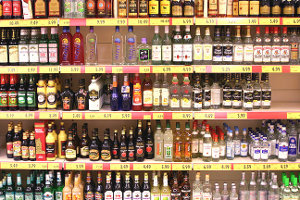What brought McHugh VA Medical Center in San Francisco was a heart attack. It literally terrified him into sobriety. He's been dry a month now, slogging through recovery with other men whose lives have also become simply untenable.
[jwplayer config="QUEST Audio Player" skin="http://ww2.kqed.org/quest/wp-content/themes/quest/glow.zip" file="http://www.kqed.org/.stream/anon/radio/quest/2011/06/2011-06-13-quest.mp3" ]
Listen to the QUEST radio story The Search for Alcoholism's Miracle Drug
McHugh’s story is a familiar one to doctors who treat alcoholism, like Peter Banys, Director of Substance Abuse Programs at the VA.
“It's always a crisis,” Banys says. “And it can be a marital crisis, a family crisis, or job termination.”
Alcoholism is a very treatable disease, says Banys. Because of all the recent research, people like McHugh have more options than ever, including AA, therapy, and medication, which can be effective in preventing relapse.
Still, there are some challenges. First of all, the meds are a tough sell, Banys says. He says his patients often think of their alcoholism as a moral weakness.
“One of the things we hear a lot,” he says, “is I don’t want to depend on a drug. They’ve been depending on a drug for 25 years, they don’t want to depend on ours.”
Another problem is that drugs that once seemed promising have often fallen short.
Take Naltrexone, which was approved in 1995. Naltrexone blocks the brain’s opioid receptors, which make alcohol feel good.
“That was the great hope,” says Banys. “It kind of crumbled in our hands.”
On many people, Natrexone has no effect all. They’re just wired differently.
And that’s proven to be a useful insight.
“One of the things that we have to make clear is that alcoholism is almost certainly not a single disease or disorder. I believe that in the near future, we will be talking about “the alcoholisms.”
The fact of these “alcoholisms” means that researchers are now targeting specific kinds aspects of brain chemistry that might be involved in alcoholism.
Howard Fields directs Human Clinical Research at the Gallo Center in Emeryville, an institute devoted to alcoholism and addiction, affiliated with The University of California, San Francisco.
What interests him is something familiar to many of us: Impulsivity. Different people are impulsive to different degrees, just like rats, and other animals. From an evolutionary standpoint, this makes sense.
“You want someone who would throw themselves on the hand grenade and save the lives of other people,” says Fields. “The same people who wind up in prison might be completely different in a battlefield situation. They might be the heroes.”
But in regular life, impulsivity can be a dangerous trait to have, says Fields. “If you score high for impulsivity, you are at greater risk to actually become an abuser or an addict. There’s no question about that.”
Fields says that in some people, impulsivity can be traced back to a specific gene. If you have it, you’re more likely to be impulsive. And it turns out, there is already a drug on the market that targets a function of this gene. It’s called tolcapone, and it’s prescribed to people with Parkinson’s disease.
So what Fields aims to find out is whether tolcapone might actually make people less impulsive. And if that’s true, whether it can help people limit their drinking. This research is now in human clinical trials.
Of course, even if the drug works for some people, it won’t work for everyone. The fact that there are “alcoholisms,” as Peter Banys put it, means that there may never be a single miracle drug.
But whatever the future holds, the goal of treatment will always look more or less the same: More people like Joseph McHugh, who have made the life-changing decision to get and stay sober.
McHugh says it’s hard to know what things will be like, once he’s out of rehab and back with his family. But he’s optimistic.
“I’m sort of glad that everything is where it is now. Because it is a change. It’s a necessary change."
37.7813092 -122.5032109
 By one estimate, there are 10 million alcoholics in the US. Photo Credit: Ralf Roletschek
By one estimate, there are 10 million alcoholics in the US. Photo Credit: Ralf Roletschek 